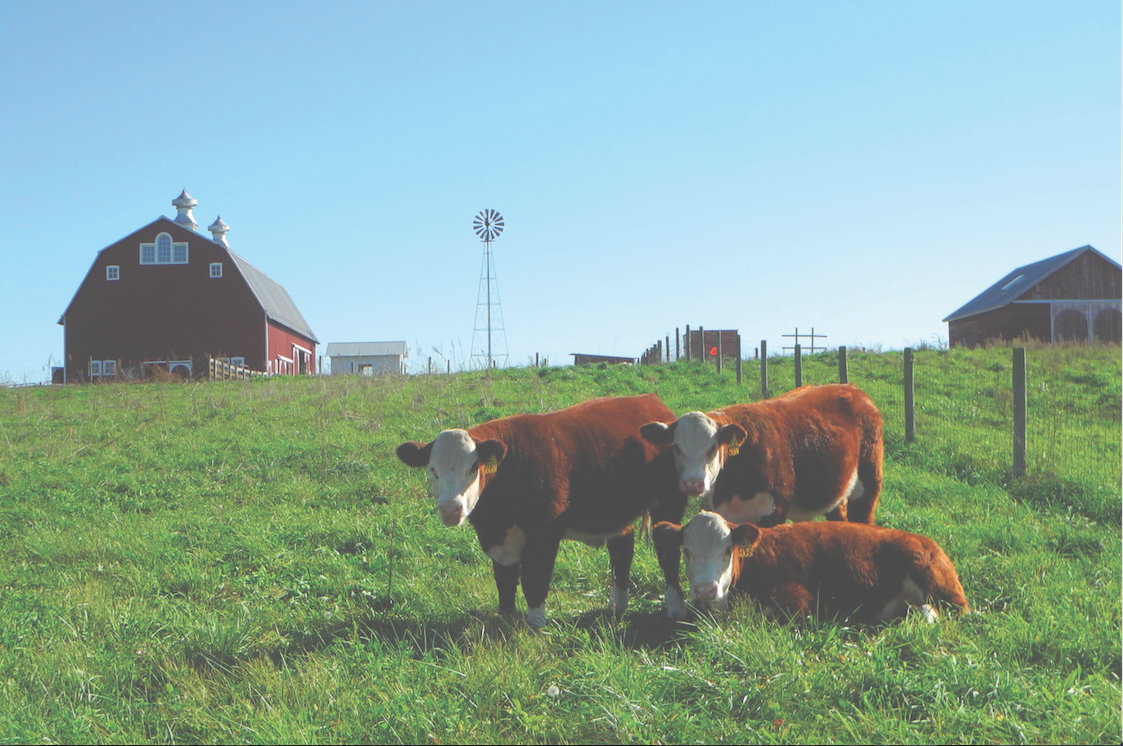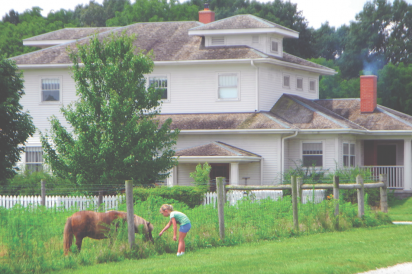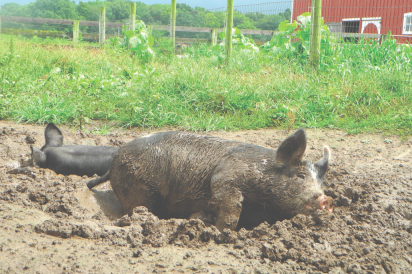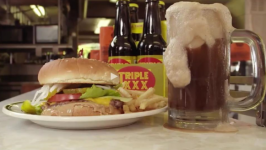The Farm at Prophetstown: Visitors on a Prairie Porch
On an unusually warm February afternoon as I sat on the front porch of the Gibson Farmhouse at Prophetstown State Park in West Lafayette, I could see a rusty winter-like field with evergreens in the distance. I remembered my first visit to the park a few summers ago; the field looked different then. That day my family and I walked through the brush sprinkled with wildflowers for an authentic Indiana prairie experience. Since then every visit has been different, depending on the season and company.
During my recent visit I sat on wicker chair and spoke with Executive Director Leslie Martin Conwell. As we talked a group of ducks noisily waddled by, a beekeeper quietly tended to his hives in the distance and two horses looked out of the barn, apparently watching for approaching visitors. Even though the park was officially closed that day, there was a steady flow of groups of people biking and hiking, as well as families with children eager to see the farm animals. Leslie paused our conversation about the farm to welcome each group, to offer directions and answer questions. As we greeted passersby, our conversation about the weather, the farm, the animals and the house didn’t feel like a typical state park experience; it felt like a passage from an imagined early-20th-century story about Indiana agrarian life titled “Visitor on a Prairie Porch.”
The brochure for the Farmhouse promises “A 1920s farmstead highlighting sustainable agriculture, homesteading, heirloom gardening and farm-to-table cooking.” But the formal description does not capture the welcoming informality of a park director guiding visitors to the hidden second-floor office because they asked for a restroom on a day when the park was closed. In fact, the experience didn’t follow an official museum script of Indiana identity. The Gibson Farmhouse at Prophetstown is an everyday community front porch, kitchen, garden, barn, farm, museum and dinner table all rolled into one.
The Farmhouse represents self-sufficient family life reminiscent of a Sears, Roebuck & Company catalog of days past. It’s as if the Farmhouse is a time capsule full of everyday objects like a sewing machine, canning equipment, stove, washtub, egg beaters, lace, china and farm equipment, that combine to make a visitor feel invited into the home of an imagined distant relative. Despite the openness and casual setting, Leslie ascribes the fact that nothing has ever been stolen during her time as director to visitors’ respect for the house. There is a palpable sense of shared trust and stewardship that make the farm feel authentic. It not only demonstrates Indiana’s homesteading history, but also boasts a community supportive of an evolving local agrarian story.
The Farmhouse community grows through the participation of volunteers who help maintain the barn and care for the animals, conscientious consumers of non-GMO farm products, life-long learners taking homesteading classes, as well as curious global and local followers on social media.
At the Farmhouse you can find a list of beef and pork items available for purchase. The meat, now sealed in clear plastic, is processed by This Old Farm nearby in Colfax, highly respected for their humane processing methods. Leslie personally cares for, and admits to being partial to, the locally bred Hereford cattle. As we walk through the farm, she talks about the trusting and gentle character of each cow. In addition to the cows, many of the other animals—including a rescued miniature pony named Mr. Bojangles—have a social media following. While Leslie was introducing me to the cows, a mom with two kids stopped to ask where to find Bojangles. That moment perfectly showcased Leslie and her staff’s great pride in their dual mission to offer humane animal care and welcoming customer service.
In addition to opening the Farmhouse and offering farm products for sale, the park also offers a long list of classes including maple sugaring, food fermenting, beer brewing, sewing, sheep shearing, quilting, handkerchief doll making, beekeeping and more. Cultivating homesteader self-sufficiency, these classes help bring a bit of the farm into our own suburban homes.
This year marks the third year of farm-to-fork dinner offerings at the Farmhouse. Through the summer and fall, visitors can enjoy a monthly five-course farm dinner. The staff and Chef Lauren Reed prepare for these dinners throughout the year by caring for the animals and freezing and preserving fresh berries, rhubarb and other produce. The dinners are a culmination of their daily work in sustaining the farm. They also host a pork fest and a breakfast buffet, making farm meals affordable for families.
In addition to her farm-to-fork duties, Chef Lauren is the education and events coordinator and the official “Chicken Maven.” She is has cared for a sick chicken in her home. “Unfortunately,” she said, “The chicken didn’t make it.” I could sense Lauren’s relief as she explained that the glamorous hens they raise are not intended for eating. I have a feeling we will not be enjoying roast chicken at the Farmhouse anytime soon.
In the kitchen you may see a collection of seeds offered with instructions on how to make new seeds. Recently, the Farmhouse received three grants to build a seed library: two from the Seed Savers Exchange and one from Purdue University. The seed library encourages people to check out heirloom seeds, feed themselves and neighbors, and return some of the future seeds to the library. Nothing could be a more poetic and literal model of cultivating community.
The Farmhouse is a reminder that we can grow a community through the joy of working, eating and solving problems together. Historically a model of self-contained family life in the 1920s, the Farmhouse today operates as a meeting place for a local and global community committed to humane animal care, ecologically aware farming, heirloom gardening, seasonal eating and more.
In the future, you might find more restored farm buildings, an heirloom orchard, a museum exhibit or gift shop at the Farmhouse. And, says Leslie, you might even enter the park through a new gate planned for the farm parking lot. This new entrance and expanding lot will make the Gibson Farmhouse, appropriately, the first welcome to Prophetstown State Park. I look forward to more visits, with different people, in different seasons. For now, I am calling to reserve our spot for dinner. Maybe I’ll see you at the dinner table.
Prophetstown.org | @FarmAtPTown | 5651 Prophetstown Rd. | West Lafayette









